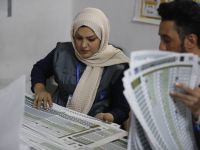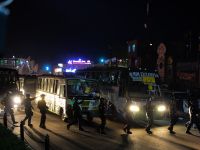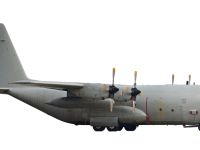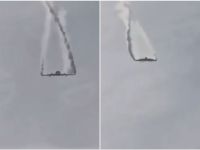By Nabil Al Mulhem
Albawaba.com - Damascus
Head of the Hamas Politburo, Khaled Mishaal, did not rule out that the Intifada will use weapons at a later stage to fight the Israeli occupation.
“The rock is not the only weapon; it is rather the available weapon at this stage,” he told Albawaba.com in an interview in Damascus. He added experiences from the first Intifada (1987-1993) have taught us that things do not remain the same.
“The 1987 Intifada started with the rock, and then developed into the Molotov, the knife, turning over cars and buses and the use of machine guns to launch martyr [suicide] attacks.”
Mishaal praised Iran for its stand in support of the Palestinian people.
“Iran is concerned with the battle for Jerusalem at the political, media and popular levels.”
He said that Iran could also support the Islamic resistance in Palestine and the Intifada. It can also be part of an Islamic-Arab front that gives the resistance “a political legitimacy” that protects the Intifada from international pressures.
He did not rule out that the Intifada will use weapons at a later stage to fight the Israeli occupation.
Asked about the relation between his group and the Lebanese Hizbollah, which spearheads resistance against Israel with the backing of Iran and Syria, Mishaal said both movements “have close ties, and they are fighting in one trench.” However, both work under different circumstances, and resist according to the resources at their disposal, “But we have one major thing in common, that is, the option of armed resistance,” he said.
He criticized the Palestinian position at Sharm el Sheikh and the Arab leaders’ meeting.
Mishaal said that many of the Arab countries’ position at the summit were more solid than that of the Palestinians, and stressed that Hamas is ready to coordinate its action with other groups. It will do so if the official position adopted involves a clear vision of what should be done, and a call to continue and escalate the Intifada with no steps backward to the negotiation table.
Following are excerpts of the interview:
Q: The Intifada in Palestine is still taking the form of fighting with the rock and the body in the face of a regular army that has escalated the confrontation by using live fire and rockets. How do you see the situation in such a situation of imbalance in power?
A: The confrontation on the Palestinian land is a live expression on the part of the Palestinian people of their determination to cling to their national soil, rights and sacred places, especially the blessed Aqsa Mosque and Jerusalem.
It is also an expression of the people’s dissatisfaction with the peace process, and its realization that the only way to force the occupier out is through the continuation of resistance and confrontation.
The rock is not the only weapon; it is rather the available weapon at this stage. Experiences have taught us that things do not remain the same.
For example, The 1987 Intifada started with the rock, and then developed into the Molotov, the knife, turning over cars and buses and the use of machine guns to launch martyr [suicide] attacks.
The are many variables in the confrontation, but there is one constant, that is, our people’s insistence to regain their rights, rejection of the occupation and their readiness to die for its cause.
Q: Let us elaborate on the variables. What role is Hamas playing in the confrontation, especially regarding the military aspect?
A: Hamas is at the core of the uprising, it even plays the role of leadership of wider sectors of our community. This is a matter of pride for us.
This uprising is for all the Palestinian people. All are patriots, and keen on being loyal to our holy shrines and land. Since the first days of uprising, Hamas has been leading the public. Everybody knows that the start of the reaction, which has been extended, came from “Birzait” and Al-Najah Universities and the Islamic University in Gaza as an initiative by the students and Islamic organizations controlled by Hamas.
Regarding the development of the uprising into a military confrontation, I would say that it is a choice. I know that our nation’s people aspire to this change.
Hamas will never refrain from doing what it should do as part of its duties and the nation’s rights. But all our people know also that Hamas has been put under massive security pressures by Zionist enemy, CIA and unfortunately the Palestinian security systems. This has inside Palestine for military actions and increasing the obstacles in their way. Our back and chest have become bare, but we are fully confident that our people in general, and Hamas in particular, are able to overcome these obstacles and fight new rounds of resistance. History has always confirmed these facts. Resistance has been up and down and so on. I mean like waves and not straight line due to the prevailing circumstances, and due to the fact that we have no army. We have only combat groups which are formed, engage with the enemy, and perhaps get imprisoned or killed and so on.
Q:Part of the conflict is Islamic in nature, and there are Islamic radical factions which Hamas is part of. What prevents you from forming a joint leadership to include all Islamic movements? By the way, what is your point of view regarding Osama Ben Laden?
A: We in Hamas have our Islamic vision, program and ideology. After all, Islam is what this nation belongs to. It is its history and civilization. But at the same time we have our identity and national heritage which ties us with our people, our land and issues. All these factors can mix but do not contradict each other. We deal on this basis and believe strongly that our nation cannot fight the real battle without taking into account our history of belonging and restoring the religious depth. This is important in the light of the fact that our enemy is revealing more and more of the religious element in dealing with this conflict. The language of even those who were classified as leftists or secularists on the Zionist side such as Peres, Yusi Belein, Barak and others, does not differ from that of Shas, Likud or any other religious parties when you deal with Jerusalem issue. Across all the Zionist political spectrum Jerusalem has, in the end, a religious depth. They claim that this is linked with their holy book and their Jewish history. They base all their hatred on many myths and hidden animosity. They do not only talk about Jerusalem but also about the holy Aqsa Mosque which they call the Temple Mount and claim that it is the holiest of their shrines, or this is at least what they claim.
So our nation has no other alternative but to restore our Islamic history. I can see that the conflict in Palestine and its nature and the means used by the enemy and his escalating attitude, has started to ally this nation and all its movements bringing them back to their origins. This is what we want whether we are Arabs, or other Arabs within the Islamic nation framework, or whether we are Moslems or Christians within the Arab nation framework.
We are all one nation fighting for our unified and cultural identity. Regarding our relation with other Islamic movements outside Palestine, I confirm that we have relationships with Islamic and other national movements. This does not necessarily require that we should have organizational unity with these movements due to the fact that the battlefields differ. Our circumstances in Palestine are different from those in the other Arab and Islamic countries. We seek unity of objectives and not a framework and organization. We instigate the Islamic nation that it has a real battle with the Zionist enemy.
Regarding Osama Ben Laden, this is a subject that I would not like to go into details about. There is no doubt that the Americans try to throw light on all Islamists in the region in order to justify fighting against Islamic expansion. I have always called on the Islamic powers not to engage in sideline battles but to unify all their power against the Zionist enemy. It is true that the American administration supports this enemy; and their interests and policies are identical; and it is Israel’s biggest ally. So the American administration is responsible for the Zionist aggression against our land and its daily massacres committed there. But I think it is necessary from our interests and logic point of view, without details, to restrict ourselves to the battle with the Zionist enemy directly, and save all our efforts for that purpose.
Q: It seems that Israel has reached an impasse. Do you believe Tel Aviv would turn it into a war in the region, and if such war were to happen, what role will Iran play? Will it be part of the war?
A: Anyone who looks at the political scene today will realize that the Zionist entity is preparing for a climate of war or aggression. But where will the war be, and what will it happen? This will be clear in the future, but let me outline certain aspects of the Zionist preparations. (Ehud) Barak’s concentration on moves to form a national unity government with (Ariel ) Sharon, or perhaps with other powers such as Shas, means a move towards war, because in historic terms, a national unity government means a war government and a hard-line one regardless of what it means for Barak and Sharon in terms of authority or party leadership. Today, there is a kind of an unprecedented unity among the various Zionist powers in favor of bloody violence against the Palestinian people and against the (Arab) nations. This raises the tone of war together with the perceived timing of an announcement by the Zionist enemy of the preparedness of Arrow or Heets missiles to retaliate to any attack according to the Zionists. Another indicator which must be taken into consideration is the speedy delivery of a nuclear-powered submarine from Germany which has the capability of carrying nuclear warheads. Israel might have speeded up its delivery to make it ready for any possible escalation (of the situation) at any time it wants. There have also been threats against Lebanon and Syria, either on the day Hizbollah captured three of the enemy soldiers followed by the capture of a fourth, or today. Then came the Zionist’s response to the Arab summit resolutions. As the Arab summit continued to reiterate the rhetoric of the broken peace, the Zionist enemy responded by halting the peace process, as if a settlement will be in the interest of the Arabs and not a burden that will hold up the real process. The American position considered the Arab summit resolutions, despite their mildness, as a declaration of war. Then comes the daily bloody violence inside Palestine which is being constantly escalated and has not been limited to the use of personal weapons, but went beyond that to tanks, artillery and rocket shelling, which all created a war climate. We were very upset that Arab leaders at the Arab summit did not deal properly with such developments and the resolutions were issued as if they (the developments) never existed.
Q: There have been suggestions that President Yasser Arafat will declare a Palestinian state, what will be your position then, and your position if a state is declared now?
A: We have always said that the Palestinian people has not been preoccupied by the declaration of a state but by defeating the occupation and liberating the land after which we will be able to establish a state.
A state in at the final stage will mark the end of the march and not its beginning, so the talk of a state has become a rhetoric moving from one station to another without being fulfilled because it lacks the basics and requirements of realities on the ground as well as prerequisites for a real state. The enemy is aware of this fact and uses it as a threat. It is now enforcing its threat and trying to effect a unilateral separation on the ground annexing large chunks of land from the West Bank and Gaza in order to leave the territories controlled by the Palestinian Authority as isolated spots or enclaves that will not lead to a state. Therefore, I believe that the current uprising must lay the foundation for a new era, for a change of the discourse and language of declared stands that first requires refusal to attend the (peace) negotiations. A venomous call by Clinton (to Arafat) to travel to Washington now must now be rejected by the Palestinian Authority.
Q: Is there a possibility for dialogue with Israeli pro-peace groups, or do you think there should be a boycott?
A: The uprising has brought down such illusions, illusions of peace or leftist groups adopting different positions from those of the enemy in crucial times. Did anyone hear during the confrontations last month that any of these groups, either the Peace Now, or Meretz, condemned the Zionist violence or opposing declared stands of Barak and Sharon and other Zionist leaderships?
© 2000 Al Bawaba (www.albawaba.com)







